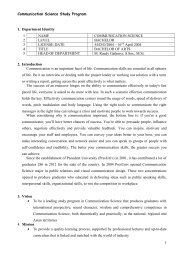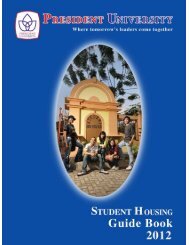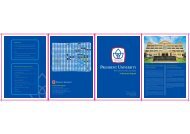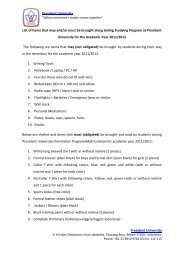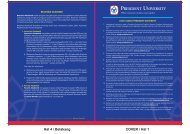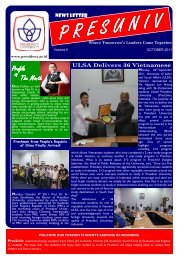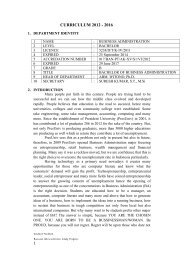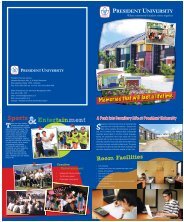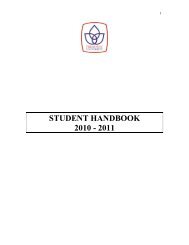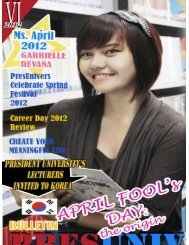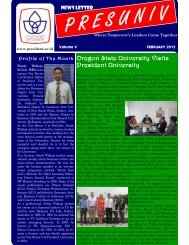Curriculum - President University
Curriculum - President University
Curriculum - President University
Create successful ePaper yourself
Turn your PDF publications into a flip-book with our unique Google optimized e-Paper software.
discuss the development of health and safety programs, safety performance management and<br />
measurement, techniques and responsibilities.<br />
CONCENTRATION COURSES: HOTEL AND TOURISM MANAGEMENT<br />
1. INTRODUCTION TO GLOBAL HOSPITALITY & TOURISM<br />
Explores the concept and practice of hospitality management in the context of the global industry<br />
and its environment at both a macro and micro level, examiningthe role, structure and size of the<br />
hospitality industry as well as environmental factors and strategies that impact on the hospitality<br />
industry.<br />
2. ROOMS DIVISION MANAGEMENT<br />
Familiarises students with the operations and procedures involved in managing the guest services,<br />
front office and housekeeping operations in international hotels.<br />
3. MANAGING & ORGANIZING CONFERENCES AND EXHIBITIONS<br />
Explores the factors involved in the provision of quality conferences and exhibitions from the<br />
marketing, management and organisation of facilities to the planning of the event.<br />
4. TOUR & TRAVEL MANAGEMENT<br />
Discover the travel intermediaries, business plan of travel and tour agencies, marketing and travel<br />
sales distribution channels and also the ticketing<br />
5. BASIC CUISINE<br />
The Basic Cuisine program opens the door to the adventures of local/international dishes. From day<br />
one, students begin to master the basic skills: from how to hold a knife properly, to how to peel<br />
vegetables or how to truss a chicken. As the term progresses, techniques are layered on one<br />
another,and become more complex. Demonstrations become more menu-oriented, incorporating<br />
such elements as organisation, preparation, balance and timing. Students also learn how to use and<br />
integrate condiments, herbs and spices into their recipes producing a variety of flavours which<br />
complement the dishes prepared.<br />
6. INTERMEDIATE CUISINE<br />
The Intermediate Cuisine introduces students to classic local/international dishes through which<br />
they will apply the techniques introduced in the Basic level program.Through practice and<br />
repetition, students begin to perform tasks more easily and instinctively. Intermediate Cuisine<br />
emphasises the importance of mise en place: understanding, organisation and production.<br />
Demonstrations highlight various kinds of presentations from platter to plate.<br />
7. SUPERIOR CUISINE<br />
In the Superior Cuisine, students learn about the current evolution of French cuisine. Full menus,<br />
demonstrated by the chefs, are inspired by trends from today’s top kitchens. Some recipes are<br />
original;others are contemporary interpretations of the classics.The ingredients are richer and more<br />
refined: exposing the students to working with such items as foie gras, truffles and lobster.Now<br />
well-versed in culinary skills, students are encouraged in Superior Cuisine to be more creative in<br />
both taste and presentation.<br />
21



